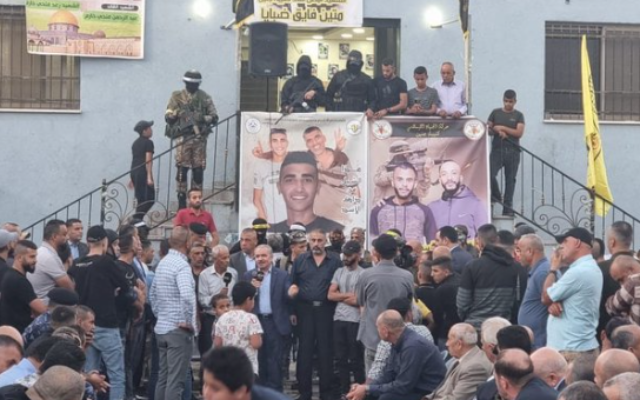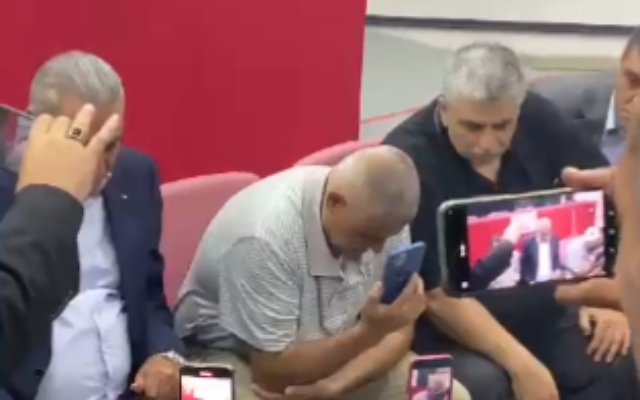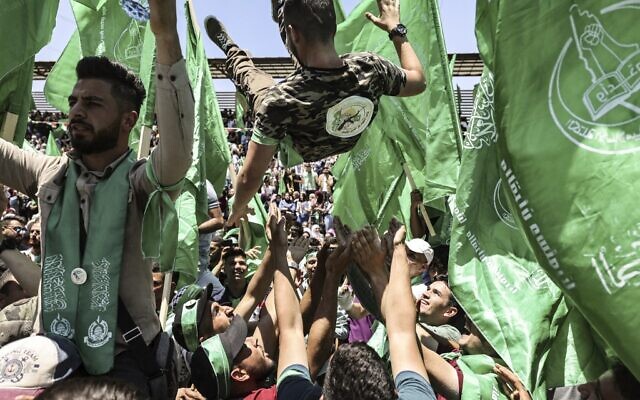Standing next to armed men and father of a terrorist who carried out a deadly attack in Tel Aviv, Mohammed Shtayyeh describes Jenin refugee camp as a symbol of Palestinian unity

Palestinian Authority Prime Minister Mohammed Shtayyeh on Sunday visited a mourning tent for Palestinian gunmen killed while confronting Israeli troops in the Jenin refugee camp in the West Bank.
In a photo published online, Shtayyeh was seen standing alongside masked gunmen wearing insignia affiliated with different terror groups, including Palestinian Islamic Jihad.
The photo also shows Fathi Hazem, the father of a terrorist who carried out a deadly shooting attack in Tel Aviv in April, standing next to the Palestinian prime minister.
“From this camp of victims, the Jenin refugee camp, we state that the blood of martyrs and the darkness of the jail cells that our prisoners are forced to endure will not be in vain,” Shtayyeh said during his visit.
“This struggle is an ongoing process, from generation to generation, victims to victims. Jenin has created national unity on the ground,” the Palestinian leader said.
“The [Jenin] refugee camp is a school of Palestinian nationality and a brother to the Shuafat refugee camp, Anata, Nablus, Rafah, Jerusalem’s Old City and to any other place that is part of the Palestinian struggle,” he added.
עוד מדברי אשתייה הערב בג'נין : אנחנו יודעים שישראל לא רוצה הסדר ושלום, והדם הפלסטיני מממן את קמפיין הבחירות בישראל. הסיפור הוא בעצם הביקור והעיתוי. כי נכון להיום הדרג המדיני הפלסטיני שמר על מרחק , והשאלה כמה אשתיה הלך עוד צעד קדימה מול לשכת אבו מאזן או בתיאום איתם. pic.twitter.com/vMYA1xcEEz
— Jack khoury.جاك خوري (@KhJacki) October 16, 2022
Shtayyeh has been Palestinian Authority prime minister since 2019, and is a member of Fatah’s Central Committee.
In recent months, the senior official has intensified his rhetoric against Israel and has been more brazen in his support for families of slain Palestinian terrorists.
His harsher tone seems to reflect a trend in Palestinian leadership in recent months.
In July, Palestinian Authority President Mahmoud Abbas himself phoned the fathers of two Palestinian gunmen killed in an exchange of fire with Israeli troops in the West Bank, and expressed his condolences.
“We are all mourning. That is our destiny and we can’t escape it. We must make sacrifices for the homeland,” Abbas said at the time.
Israel has long accused Abbas’s PA of encouraging terrorism and militant activity by publicly honoring gunmen and attackers and by paying stipends to their families if they are killed or jailed in Israeli prisons.

According to some analysts, leaders’ more overt support for Palestinian armed groups and may be part of an attempt to win greater support in the face of the growing popularity of the Hamas terror group.
Abbas scrapped elections scheduled for last year, citing Israel’s refusal to allow voting in Israeli-annexed East Jerusalem, which Palestinians seek as their capital. But Palestinian analysts said Abbas balked out of fear that Hamas, which controls the Gaza Strip, would also trounce Fatah across the West Bank.
In May, Hamas won 28 of the 51 seats on the student council at Birzeit University, marking the first time candidates aligned with the Islamist terror group have gained control of the body. Fatah used to dominate student councils in the West Bank.

Shtayyeh’s visit to Jenin on Sunday comes amid heightened tensions in East Jerusalem and the West Bank.
The IDF and police have been on heightened alert since late last month amid the Jewish holiday season, with tensions already high due to an Israeli anti-terror offensive that has seen over 100 Palestinians killed (many, but not all, in gunfights or during riots) and more than 2,000 arrested in nightly raids in the West Bank.
The northern West Bank has seen a surge in violence in recent months, with Palestinian gunmen targeting military posts, troops operating along the West Bank security barrier, Israeli settlements, and civilians on the roads.
The military’s liaison to the Palestinians said Sunday it had revoked the entry permits to Israel from 164 family members of Palestinian “terror elements” in the West Bank city of Nablus.
As reported by The Times of Israel
